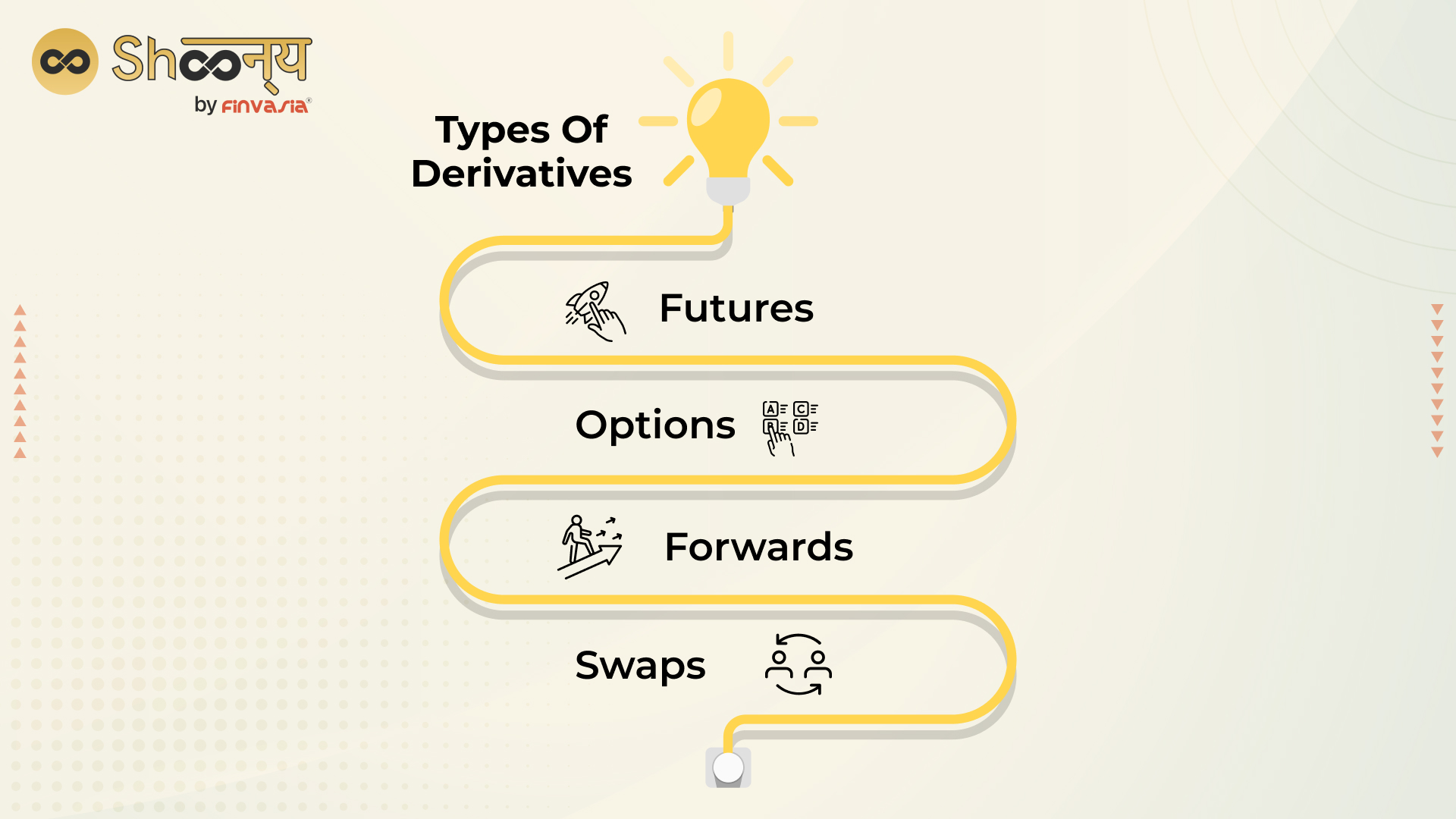What Are Derivatives in Stock Market: Know the Types, Advantages, and Disadvantages

In the complex landscape of finance, understanding derivatives is paramount for Indian investors seeking to navigate markets and manage risks effectively. This article delves into the intricacies of derivatives, encompassing their types, advantages, disadvantages, and practical examples, catering to the Indian audience’s financial aspirations.
What Are Derivatives?
At its core, a derivative is a financial contract whose value hinges on another asset. Specifically, financial derivatives derive their value from an underlying asset, be it stocks, bonds, commodities, interest rates, market indexes, or currencies. This underlying asset’s value fluctuations trigger changes in the derivative’s value.
Types of Derivatives That You Must Know.

1. Forwards: Customized Agreements
Forwards are like personalised contracts between two parties. Imagine you’re a farmer, and you want to secure a good price for your upcoming wheat harvest. You make a deal with a bakery owner to sell your wheat at today’s price three months from now, regardless of whether wheat prices rise or fall. This agreement is a forward contract. It’s unique to you and the bakery owner and isn’t traded on a formal exchange.
2. Futures: Standardized Deals
Futures are similar to forwards but more like “off-the-shelf” agreements. Picture a group of investors worried about the future price of gold. They can all buy or sell gold contracts on a commodities exchange like the Multi Commodity Exchange of India (MCX). These contracts are standardized, so anyone can participate, and they’re regulated by the exchange.
3. Options: Flexibility for Risk Management
Options are all about choices. Imagine you’re an investor holding shares of a company, and you’re worried the stock might drop. You buy an “insurance” option that gives you the choice to sell your shares at a fixed price within the next month. If the stock falls, you can still sell at the higher price you locked in with the option. If the stock rises, you’re free to ignore the option and sell at the market price. It’s like having a safety net for your investment.
4. Swaps: Exchange of Benefits
Swaps are like barter systems for finances. Consider two companies, one based in India and the other in the United States. The Indian company is concerned about the exchange rate between the Indian rupee (INR) and the U.S. dollar (USD). The U.S. company has similar concerns about the INR. So, they agree to swap a portion of their earnings in their respective currencies. This way, both companies hedge against currency risks.
Advantages of Derivatives for Investors
- Hedging Risks: Derivatives serve as a financial safety net, helping investors hedge against potential losses. Just as a corn farmer locks in a price for his produce, Indian investors can use derivatives to shield themselves from market uncertainties.
- Low Transaction Costs: Derivatives trading incurs lower transaction costs compared to other securities like stocks or bonds. This makes them an attractive option for cost-conscious Indian investors.
Disadvantages of Derivatives For Investors
- High Risk: As derivatives’ value hinges on underlying assets, their prices are susceptible to market fluctuations. Indian investors must be aware of this inherent risk, especially when dealing with unpredictable markets.
- Speculative Nature: Derivatives are often employed for speculation, aiming to profit from market fluctuations. However, their speculative nature can lead to substantial losses, particularly in volatile scenarios.
Exploring Derivatives with Practical Examples
To grasp the concept better, let’s consider an Indian context. Imagine a software company anticipating currency fluctuations due to international dealings. To mitigate risk, they engage in a currency swap, exchanging fixed interest payments in one currency for floating payments in another, curbing potential losses.
Overcoming Counterparty Risk
While over-the-counter derivatives involve counterparty risk, Indian investors can opt for exchange-traded derivatives. These standardised contracts reduce counterparty risk by involving an intermediary exchange.
Conclusion
In India’s dynamic financial landscape, derivatives play a pivotal role in risk management and investment strategies. Armed with knowledge about types, advantages, and disadvantages, Indian investors can navigate the derivatives market with confidence, securing their financial futures while staying mindful of potential pitfalls.
Frequently Asked Questions: Derivatives
Derivatives demand a solid understanding of financial markets. Indian beginners should start with comprehensive education and seek expert advice before engaging.
Yes, Indian individuals can trade derivatives through recognised exchanges. However, proper knowledge and risk assessment are crucial before entering the derivatives market.
Derivatives are like versatile tools: one, they help people protect themselves from wild price swings; two, they’re a way to bet on which way the wind blows in the market; three, they give you a chance to do more with less, sort of like financial acrobatics.
Derivatives suffer from- market ups and downs, counterparty letdowns, and liquidity hiccups.
The trouble with derivatives is like playing with fire – if you don’t know how, you might get burned. They can turn small mistakes into big messes because of the borrowed money involved. And sometimes, folks need to fully grasp what they’re getting into, leading to financial chaos.
Consider options as the ‘what if’ cards and futures as the ‘must do’ cards in the derivatives deck. Options let you choose to buy or sell, while futures make you commit to buying or selling at a specific price.
The big shots among derivatives are options, futures, swaps, and forwards. Each of these plays a different role in the financial playground, from dodging risks to aiming for big gains.
______________________________________________________________________________________
Disclaimer: Investments in the securities market are subject to market risks; read all the related documents carefully before investing.








